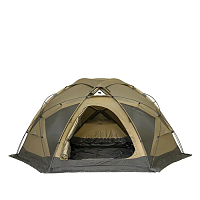Cart
What are some tips for choosing a backpacking tent based on weight?
What is backpacking tent weight?
Backpacking tent weight refers to the total weight of a tent that is specifically designed for backpackers. It includes the weight of the tent body, rainfly, poles, stakes, guylines, and any other accessories that come with the tent.
Why does backpacking tent weight matter?
The weight of a backpacking tent is crucial because backpackers carry all their gear on their backs. The lighter the tent, the less strain it puts on the backpacker's body, allowing for easier and more enjoyable hikes. Additionally, lighter tents can often be packed down into smaller sizes, making them easier to fit into a backpack.
What is considered a lightweight backpacking tent?
A lightweight backpacking tent is typically defined as weighing less than 5 pounds (2.3 kilograms). However, ultralight backpackers often aim for tents that weigh under 2 pounds (0.9 kilograms) to further reduce the weight they carry.
Are lightweight tents durable?
While lightweight tents are designed to be lightweight, they are still made to be durable and withstand outdoor conditions. Many manufacturers use high-quality materials, such as ripstop nylon, to ensure the tents' longevity. However, lightweight tents may not be as durable as heavier tents in extreme conditions, so it's essential to choose a tent suitable for the type of adventures planned.
Are lightweight backpacking tents comfortable?
Lightweight backpacking tents can be just as comfortable as heavier ones if properly chosen. Many modern lightweight tents have innovative designs that maximize internal space, ventilation, and waterproofing. It's important to consider personal preferences regarding the interior space, headroom, and ease of entry and exit when selecting a lightweight tent.
What are some tips for choosing a backpacking tent based on weight?
- Consider the number of people who will be using the tent. Larger tents tend to be heavier. - Evaluate the weather conditions the tent will be used in. For harsher conditions, a sturdier and slightly heavier tent may be necessary. - Pay attention to the materials used in the tent construction. Lightweight yet durable materials are preferable. - Consider the tent's features, such as vestibules and pockets, to ensure they meet specific backpacking needs while minimizing excess weight.
Conclusion
When it comes to backpacking, the weight of the tent is a critical factor. Choosing a lightweight and appropriate tent ensures a more comfortable and enjoyable backpacking experience. By considering factors such as weight, durability, and comfort, outdoor enthusiasts can find the perfect backpacking tent to suit their needs.
- Contact Us
-

About Pomoly
Pomoly is a leading camping brand specializing in hot tents and tent stoves. We are camping life explorer, Follow Page / Join Group, let's make camping enjoyful together!
Working Hours
Mon-Fri, 09:00 - 17:00

- Company Info
- NEWS
- About us
- Pomoly Name
- Leave-No-Trace
- Contact Now
- Facebook Group
- YouTube Learning
- Contact Us
- Topic Collections
- Policies & Terms
- Payment Policy
- Shipping Policy
- Return & Refund
- Privacy Policy
- Terms of Use
- Tax Policy
- Website Disclaimer
- Safety Disclaimer
- Warranty Policy
- Promotion Policy
- Pre-order Policy
- INTELLECTUAL PROPERTY RIGHTS
- Dealers Agreement And Terms
- Become Affiliate
- User Center
- Forget Password
- My Orders
- Tracking Order
- My Account
- Register
- Popular Searches
-
Tipi Tents Dome Tents Camping Tent Hammock Stove Camping Camping Pellet Stove Circle 6 Titanium Water TankDome X Locomotive 20 LEO 2 camping tent T-Brick 2.0 T1 2.0 tent stove Dweller wood stove Oroqen 2.0 Chimney Water Tank Lumberjack STOVEHUT Bromance 70 Tipi Pomoly Coupon Baker Oven Stove Titanium elbow Fire Pits Tent Stove titanium Stove Outdoor Pellet Stove
keebon pellet stove






